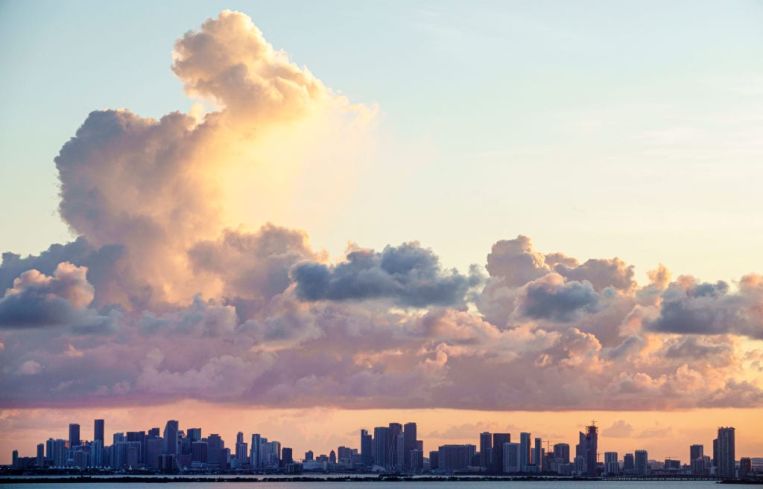Miami’s Leading CRE Voices on Solidifying the City’s Growth
By Julia Echikson March 17, 2022 5:44 pm
reprints
This last year has been one hell of a ride for Miami real estate. Just look at Mast Capital.
In 2021, the firm bought a 292-townhome complex in Homestead for $51 million and within nine months had outperformed its five-year business plan. CEO Camilo Miguel Jr. had assumed rents would go up by $150 a month. Instead, they skyrocketed by $600, the chief executive said at Commercial Observer’s South Florida Forum, held virtually earlier this month.
Industry leaders, including Kushner’s Laurent Morali and Royal Palm Companies’ Dan Kodsi, gathered to discuss the challenges that arose from Miami’s recent boom at the forum, titled “The Magic Movement: Building Miami to Last.”
And it’s hard to believe that some of Miami’s hottest neighborhoods, such as Wynwood, barely existed a little over a decade ago.
“When my dad [Tony Goldman] stood on NW 2nd Avenue and 26th Street, nobody was walking down the street. You could roll a bowling ball down the middle of the street,” said Jessica Goldman Srebnick, co-chair of Goldman Properties. “He said this is going to become the center for the creative class.”
And it has. Wynwood — in part thanks to the mural exhibition launched by Tony Goldman — is now home to high-profile restaurants and companies.
As the Magic City grows, it’s still all about showmanship.
“We’re not trying to do what’s expected. We’re trying to shock with the offerings,” said Jay Philip Parker, Douglas Elliman’s Florida CEO. Miami continues to welcome one ultra-luxury branded condominium after another, such as Mast Capital’s Cipriani tower in Brickell or Gil Dezer’s Bentley building in Sunny Isles Beach. They don’t build them like that in New York.
There’s still a whole set of wealthy executives that Miami has yet to capture, according to Starwood Property Trust President Jeff DiModica.
“The headlines are being driven by the CEOs that are moving here. But I don’t think we’re there yet with the vice presidents. It’s hard to get people to leave when they’re 25 to 40,” DiModica said. “The challenge for the next phase of growth is ‘are we going to be able to attract the vice president-level homebuyer, who wants to raise their family here?’”
Miami is still dealing with the aftermath of the CEO migration. With increased competition, deals are hard to find these days.
“Every developer in the country is now looking at Miami, driving up land prices,” said Jon Paul Pérez, president of the Related Group, Miami’s largest developer. Ronnie Levine — senior managing director at commercial lender Meridian Capital Group — agrees. “They’re looking wherever they can find land,” Levine said of his clients.
The lack of high-quality schools is another challenge for Miami.
Florida is notorious for having poor public schools. Now private institutions are fully occupied, without enough capacity for all the families who flocked to Miami. “The schools are a real issue,” said Cushman & Wakefield office leasing broker Brian Gale. “Not everybody wants to send their kids to public schools.”
Avenues, the New York private school whose annual tuition costs upwards of $60,000, remains the great hope. The school is building a campus in Miami with plans to open in the coming years. The institution was the event’s buzzword, named dropped at least five times by developer Don Peebles and others, according to this reporter’s count.
Rickelle Williams, the economic development director of the Miami Beach government, however, would like you to know that the municipality is investing in its public schools with additional programs and services.
Perhaps the biggest takeaway from the event was to never count out Miami.
“Are there challenges ahead? For sure. We’re hopeful that we can work with the right governing body to build the infrastructure that not only Miami — but all of Florida — needs,” said Erik Rutter, co-founder of Carpe Real Estate, which developed the popular Oasis mixed-use complex in Wynwood.
“Miami is a baby of a city. [It] has now the opportunity to be the first 21st-century city in the United States of America and allow its infrastructure to be tech-enabled,” Rutter said.
Also on the panels were Aaron Kurlansky, principal of Sheridan Capital, Brett Mufson, president of Fontainebleau Development, Justin Oates, senior vice president at Cain International, as well as moderators Jennifer Recine, partner at Kasowitz Benson Torres, and Meyer Mintz, partner at Berdon.
Julia Echikson can be reached at jechikson@commercialobsever.com.



